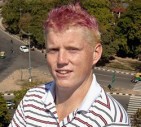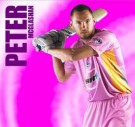David Boon Interview
James Nixon |Having been a member of several successful Australian sides, David Boon has rightfully established himself as one of the greats of the modern game. A tenacious character, a wide array of shots and tight techniaque made David Boon into a player most bowlers found difficult to remove. Since he retired, David Boon has distinguished himself as a selector of the Australian Test side and is now the Media and Public Relations manager at the Tasmanian Cricket Association. In this interview, Boon recounts some of the highs, lows and in-betweens of his Test and early career as a cricketer. David was extremely generous in the answers provided and in the flurry of emails which ensued between us whilst trying to organise this so for that I’d like to offer my profound thanks and hope he can contribute in the future to Cricketweb in other ways.
CW: Who was the biggest influence on your sport as a child and teenager? Who then was the biggest influence on your cricket in your initial development and when you eventually played for Tasmania?
DB: As with most children the biggest influence on my sport were my parents. Both were heavily involved in sport and their support was invaluable to my early years and my attitude to sport. The other person was Jack Simmons who was my first coach and still remains a close family friend.
CW: As an 18-year old, you were part of Tasmania’s Gillette Cup win in 1979. This was a significant win as this was Tasmania’s first interstate title of any kind to this point. As a very young member of the side, could you describe your feelings at the time in terms of how you felt about Tasmania’s progress as a state to be reckoned with as well as your thoughts about how a win like this was to affect your chances of representing Australia?
DB: My thoughts were ones of excitement and achievement for the team. It was our first title and signalled that Tasmania was ready to be a part of Australian cricket. As far as representing Australia, this was a stepping-stone for all Tasmanians and their belief that they could compete. I don’t believe this affected my chances of playing for Australia at all.
CW: The 1987 World Cup is credited as the turning point for Australian cricket in terms of their subsequent dominance but the 4th Test of the 1986/87 series against England is where it really began, according to those who know. Legend has it that AB said after the loss in that Test, I’m sick of losing and being a nice guy. I’d rather be a prick and win. Or words to that effect. Could you describe the mood of the dressing room at the time and the others’ reaction to AB’s words as well as how you personally reacted (provided the incident in question happened). What was the resultant change in attitude on the field?
DB: The 1987 World Cup victory was certainly a turning point. It gave us confidence and helped the rebuilding of Australian cricket. We had won in Sydney during a time when victory was scarce but the entire squad were responsible for the World Cup. AB said a lot of things during those difficult times and was always justified in his statements. As to the one you are referring to I could not be definite.
CW: The 1987 World Cup campaign was where Australia was finally taken seriously as an opponent to be reckoned with. Australia won most of its group matches and then won the semi-final and final in closely fought matches. You topped the Australian run-getters chart and won the man-of the-match award in the final against England. Could you recount your experience of the final in terms of how you felt at winning the World Cup and at playing such a pivotal role in the win? Could you also offer your opinion as to how much the win meant to Australian cricket and to you as a player?
DB: After the initial excitement of winning the World Cup, celebrations were subdued as everyone was still stunned and extremely tired after a hard, long campaign. The resultant way the team improved and gained in confidence was definitely taken into the Test arena. Bob Simpson had an enormous influence on this attitude and I believe this was the start of Australia’s resurgence and the growth of the team into what you see today.
CW: The 1992/92 Test series against the West Indies started well for Australia (and you personally with a hundred in the first Test) but when the West Indies fought back in the Test at Adelaide Oval, things went downhill fast for Australia. Given that you were hit by a Curtly Ambrose delivery and that Australia lost one of the closest Tests in history, could you describe the atmosphere on the last day in the dressing room and how you personally felt about the loss?
DB: The loss was one of the hardest to take. The dressing room was silent for some considerable time. To be so close to beating the best team in the world was a hard pill to swallow. The fact that I had been hit had no bearing on those feelings at all.
CW: You were the recipient of Shane Warne’s hat-trick ball against England in 1994. How did it feel to be part of something so special for someone else? What were you feeling and thinking immediately before and after the ball was bowled and when you took the catch?
DB: Being a part of team is one of the greatest things you can experience. Being a part of someone else’s success is part of team spirit and a fantastic thing to be involved in. I was lucky enough to be that person in this case and it will stay in my memory forever.
CW: The Australian team toured the West Indies in 1995 to contest the Frank Worrell Trophy, which had been held by them for many years. Australia won and you played your 100th Test during the series. Could you please describe how it felt to finally beat the West Indies in the West Indies and what you think it meant for Australian cricket? Also, could you please describe how it felt to reach a milestone such as playing 100 Tests for your country?
DB: To reach your 100th Test for your country is certainly an honour but to win the Sir Frank Worrell trophy put that achievement into insignificance. This was something we had been working towards for many years. It was great that AB was there but a little sad that he was not a player.
CW: In your career, you took many stunning catches at short-leg off guys like Craig McDermott and Warne. What technical and mental tips can you offer to players wanting to field there?
DB: There are many tips that you could pass on. Generally they all involve hard work and practice. Short leg is now a specialist position and a catch can turn the game but the most important thing is that you want to be there.
CW: Short answer questions
Best innings and why: Technically, 143 v New Zealand in Brisbane but the most important mentally was my 184 in the Bi-Centennial Test v England as I had been dropped the year before against the English.
Best bowler faced and why: Day in day out, Malcolm Marshall. He was one of the most consistent performers I played against. Always at you, fast and with the ability to swing it both ways.
Quickest bowler faced: This is always a difficult question to answer as each fast bowler has his day and once you get to 90 miles per hour there is not a lot of difference.
Opinion on current best bowler/batsman in world cricket today and why: I wouldn’t like to say. Ranking is difficult and there are again many fine players in the world today who each on their day could be recognised as the best.
Best piece of advice you ever received: ‘Never say what if’
Up-and-coming player to watch: Marcus North, Michael Clarke and Xavier Doherty





Leave a comment